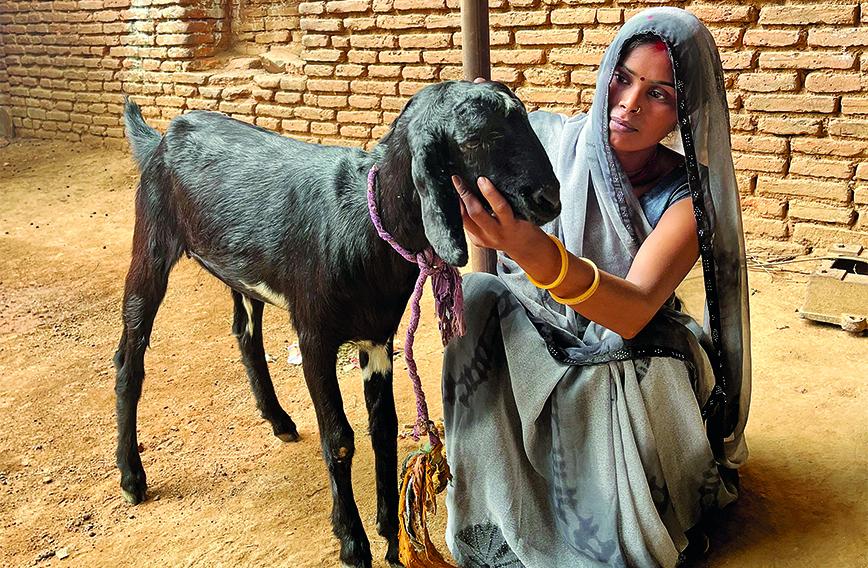
Bharti Aharwar, a para-vet in Tikamgarh
Goats get a good deal with women para-vets
Bharat Dogra, Tikamgarh
Bharti Aharwar, a Dalit woman of Nadia village in Tikamgarh district, Madhya Pradesh, was finding it difficult to make ends meet. Her husband even went to Delhi in search of better earning opportunities but no stable solution had emerged.
So, when she learnt from an activist of Srijan, a social organization, visiting her village, about their plan to train a few women to become para-vets who could medically treat goats, Bharti decided not to miss this opportunity. She joined training sessions organized by the Goats Trust, a Lucknow-based organization, and learnt how to identify and treat common diseases afflicting goats and handle vaccination and nutrition.
While cows and buffaloes are the most familiar face of animal husbandry in India, for most rural poor households, goats are even more important. This reality came to light through surveys conducted in some villages of Tikamgarh district which showed that an overwhelming majority of small farmers and landless households kept goats.
The average size of herds appeared to be small, about five goats or so, but the goats were an insurance during difficult times. A healthy, well-grown goat could be sold for as much as Rs 15,000 to 20,000.
While the milk yield from goats is small, it is quite high in nutritive value. The manure obtained from the excreta of goats is recognized by villagers as being very useful for the fertility of their farmland. What’s more, goats cost very little to keep.
However, one problem goatkeepers often face in rural areas is disease. Diseases spread quickly in bigger herds. While the average herd size may be small, some villagers keep bigger herds of 50 to 100 goats. So protection from disease is important for those keeping goats, but medicines and vaccinations are not readily available in villages.
That’s why the concept of pashu sakhis, or rural women para-vets, has evolved in Tikamgarh district and drawn much attention. Enterprising women from the rural community are trained as vets to provide protection and treatment to goats.
Bharti’s training gave her confidence. After training, she was ready, with her bag of medicines and smart new uniform, to go to various households where goats needed treatment. Her treatment was perceived to be quite successful and villagers soon acquired a new respect for the pashu sakhi (friend of animals). This recognition increased further when Bharti held health camps for goats for vaccination and deworming.
Villagers soon realized the value of having a para-goat vet right in the village, whose treatment could be availed of whenever needed at very low cost.
With the help of a farmer-producer organization (FPO), it was possible for the village to arrange for the timely supply of not just medicines but also nutritious feed prepared by women members belonging to the FPO. Bharti also sells this feed to those interested in buying it, earning a modest commission in the process. Her main earnings, however, come from the treatment and vaccination she provides to goats for modest fees. With this income, Bharti has been able to arrange better education for her children.
Maya Ghosh, from Bijrawan village of Tikamgarh district, was one of the first pashu sakhis to emerge here. Maya is very happy she decided to take up this work. She saved her earnings and gifted a motorcycle to her husband. Her next target is to buy a scooty so that she can reach households in a nearby village whom she cannot reach now since she doesn’t have transport.
Hira Devi is another pashu sakhi, in Kaanti village. She said that, initially, when she started attending to sick goats after her training, some villagers expressed doubts about her skills. To prove them wrong, she bought a very ill goat and nursed it back to health. After this she gained the acceptance and respect of villagers, and there has been no looking back for her.
The Tikamgarh experiment to train 10 pashu sakhis has been so successful that within a relatively short time, the number of goat para- vets in the district has risen to about 76. In addition, this successful effort has caught on in some neighbouring areas as well and spilled into adjoining states. Government officials have also expressed interest in taking the initiative forward. Government programmes for subsidized increase of goat-based livelihoods among weaker sections of rural communities already exist.
Rakesh Kumar, coordinator of Srijan’s activities in Tikamgarh, says that the learning and skill development of pashu sakhis has surpassed expectations as the women quickly learnt many things which their trainers thought they would take more time to grasp. Srijan has also tried to help goatkeepers secure a better rate when selling goats.
Non-conventional uses of goats add to their value. While generally goats are sold for their meat, several families, particularly children and women, become very attached to goats. It is always a difficult time when the goat is sold, despite the cash that comes in. Some women and children say that they did not feel like eating when their goat was sold. One reason for this is that goats are very endearing animals, particularly the kids. Goats, especially kids, can be sold as pets in urban areas, where they can be kept in a corner of a lawn or other open space.
Comments
Currently there are no Comments. Be first to write a comment!



